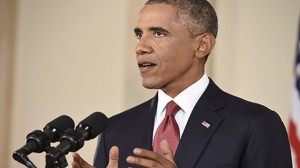 WASHINGTON (AP) — After 15 years of a virtual gag order on guns in presidential politics, Democrats are talking again.
WASHINGTON (AP) — After 15 years of a virtual gag order on guns in presidential politics, Democrats are talking again.
President Barack Obama is considering more executive action on gun control. The front-runner in the Democratic race to replace him says she “will not be silenced” on guns. At the Democrats’ first debate in the presidential season, candidates jockeyed for bragging rights over who had the lowest rating from the National Rifle Association.
The return of the gun debate comes in the first White House contest since the December 2012 shootings in Newtown, Connecticut, that killed 20 children and six educators at an elementary school, and a string of mass shootings after that. The absence of gun legislation passed by Congress has spurred a steady call for action from the Democratic base.
Democrats say support for new gun laws is broader now and the politics of the issue have shifted enough to make the push for tougher measures a political winner, even if there remains almost no chance for success in Congress.
Republicans are eager for Democrats to test the theory.
They watched the Democratic debate and saw fodder for advertising aimed at rural voters and gun owners still firmly opposed to putting more restrictions on gun purchases. Those voters have tended to retain their passion on the issue and have been motivated to vote, long after a shooting recedes from the headlines.
The White House has been upfront that it plans to keep attention on the issue.
Obama has directed his staff to review gun laws for possible ways he could make changes without congressional approval.
One option could be changing regulations to ensure gun show and Internet purchasers are subject to background checks, a move that would probably run into a court challenge over whether he has that authority.
It would risk a backlash from supporters of gun rights — one that could complicate Obama’s agenda in Congress and create trouble for Democratic lawmaker running in conservative or rural districts.
But Democrats increasingly argue that fears of such a backlash are overblown, particularly if the issue is framed narrowly.
“You see such strong support all across the country for proposals like closing the gun show loophole,” White House spokesman Josh Earnest said, urging Congress to act. “There’s ample public data to indicate that even a majority of gun owners support something like this.”
A July Pew Research Center poll found that 85 percent of those questioned, including 87 percent of those in gun-owning households, support requiring background checks for private sales and at gun shows. But on the more general question of whether gun laws should be tighter, just 52 percent of respondents overall agreed, in a CBS News poll conducted in July and August.
That survey found 77 percent of Democrats in favor of tighter laws, a number that helps explain why the issue has lit up the Democratic primary. Hillary Rodham Clinton has kept up a drumbeat for weeks, using the issue to try to drive a wedge between liberal Democrats and her top rival, Vermont Sen. Bernie Sanders, who has voted against some gun control legislation.
Clinton on Friday suggested that the U.S. might consider a gun buy-back program and mocked the gun lobby for opposing such measures.
“They just scare responsible folks into thinking that the black helicopter is going to land in the front yard and someone is going to come and take away your guns,” she said.
Chris Cox, executive director of the NRA’s Institute for Legislative Action, said the buy-back idea “validates what the NRA has said all along. The real goal of gun control supporters is gun confiscation.”
It was hard to imagine Democrats picking a fight with the NRA in past presidential contests.
Democrats’ electoral losses after the 1994 passage of the ban on assault-type weapons had a chilling effect on the debate. President Bill Clinton posited that Vice President Al Gore lost the 2000 election because of opposition to Gore’s gun stance in his home state of Tennessee and other rural, right-leaning states. Democrats have since all but taken the issue off the table in national campaigns.
The former president’s analysis has been disputed by some who say it exaggerates the influence of the NRA in the election, but its impact has been clear. Obama made scant reference to gun control in either of his campaigns. John Kerry, the 2004 nominee, memorably emerged from the cornfields of eastern Ohio carrying a shotgun after hunting geese.
The photo op was aimed at rural, white voters, who have become less critical for Democrats’ path to the White House. Democrats are no longer dependent on winning states such as Tennessee, Arkansas or West Virginia, where skepticism of any new gun law runs deep, and more reliant on energizing African-American, Latino and unmarried female voters.
Republicans strategist Ed Goeas said the Republican nominee will be braced for a debate over guns and ready to talk about perpetrators of mass shootings, focusing on improving mental health systems.
Advocates of tighter gun laws are heartened by the fact the debate even exists.
“Guns have been considered a third rail issue especially for Democrats and now major presidential candidates are actually running on it,” said Dan Gross, president of the Brady Campaign to Prevent Violence. “For someone like me, it’s almost surreal to watch.”
